Taxation Law: Assessable Income and Capital Gains Analysis Assignment
VerifiedAdded on 2022/08/26
|11
|2883
|16
Homework Assignment
AI Summary
This taxation law assignment provides a comprehensive analysis of assessable income and capital gains, referencing relevant legislation and case law. The assignment addresses two key questions. Question 1 examines Emmi's assessable income, including tips, employment income, gifts, and fringe benefits, determining the tax implications of each. Question 2 delves into capital gains tax (CGT), analyzing the tax treatment of assets sold by Liu, including her main residence (pre-CGT asset), a personal use car, assets related to a small business enterprise, furniture, and collectables. The assignment applies relevant sections of the Income Tax Assessment Act 1997 (ITAA 1997) and the Fringe Benefits Tax Assessment Act 1986 (FBTAA 1986), providing detailed explanations and calculations to determine the tax liabilities and exemptions for both Emmi and Liu. The analysis includes discussions on ordinary income, CGT events, personal use assets, small business CGT concessions, and the specific rules governing collectables.
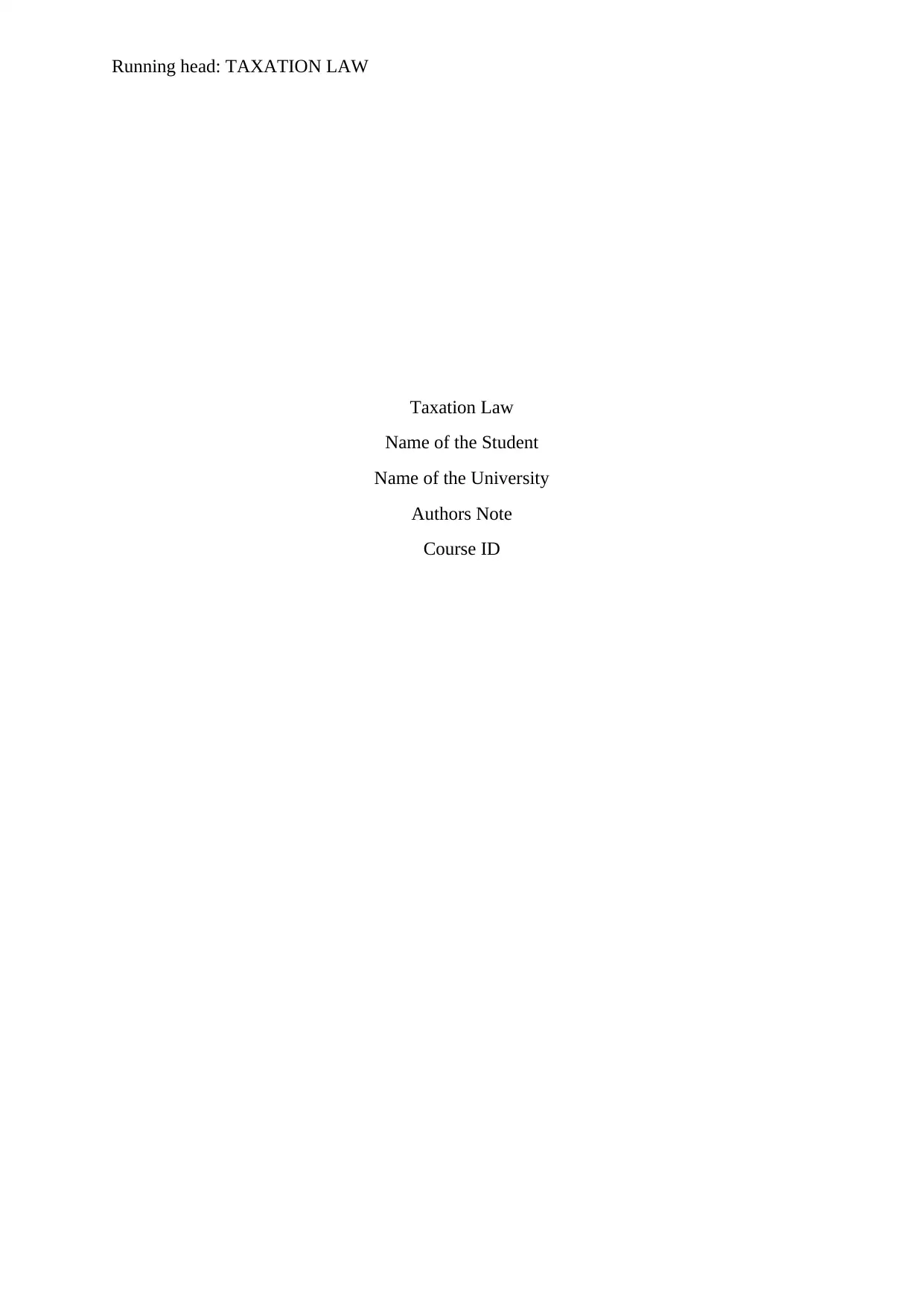
Running head: TAXATION LAW
Taxation Law
Name of the Student
Name of the University
Authors Note
Course ID
Taxation Law
Name of the Student
Name of the University
Authors Note
Course ID
Paraphrase This Document
Need a fresh take? Get an instant paraphrase of this document with our AI Paraphraser
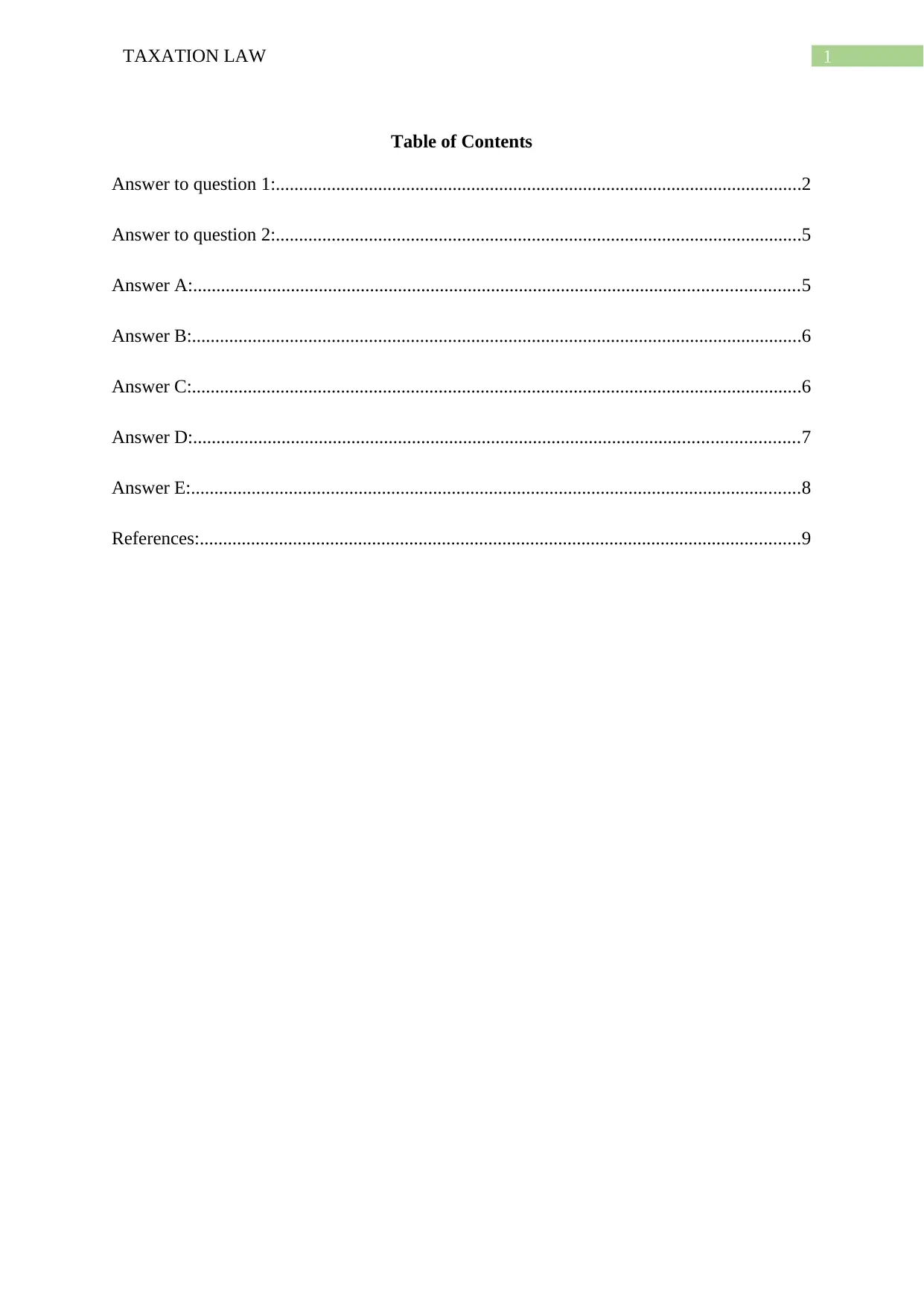
1TAXATION LAW
Table of Contents
Answer to question 1:.................................................................................................................2
Answer to question 2:.................................................................................................................5
Answer A:..................................................................................................................................5
Answer B:...................................................................................................................................6
Answer C:...................................................................................................................................6
Answer D:..................................................................................................................................7
Answer E:...................................................................................................................................8
References:.................................................................................................................................9
Table of Contents
Answer to question 1:.................................................................................................................2
Answer to question 2:.................................................................................................................5
Answer A:..................................................................................................................................5
Answer B:...................................................................................................................................6
Answer C:...................................................................................................................................6
Answer D:..................................................................................................................................7
Answer E:...................................................................................................................................8
References:.................................................................................................................................9
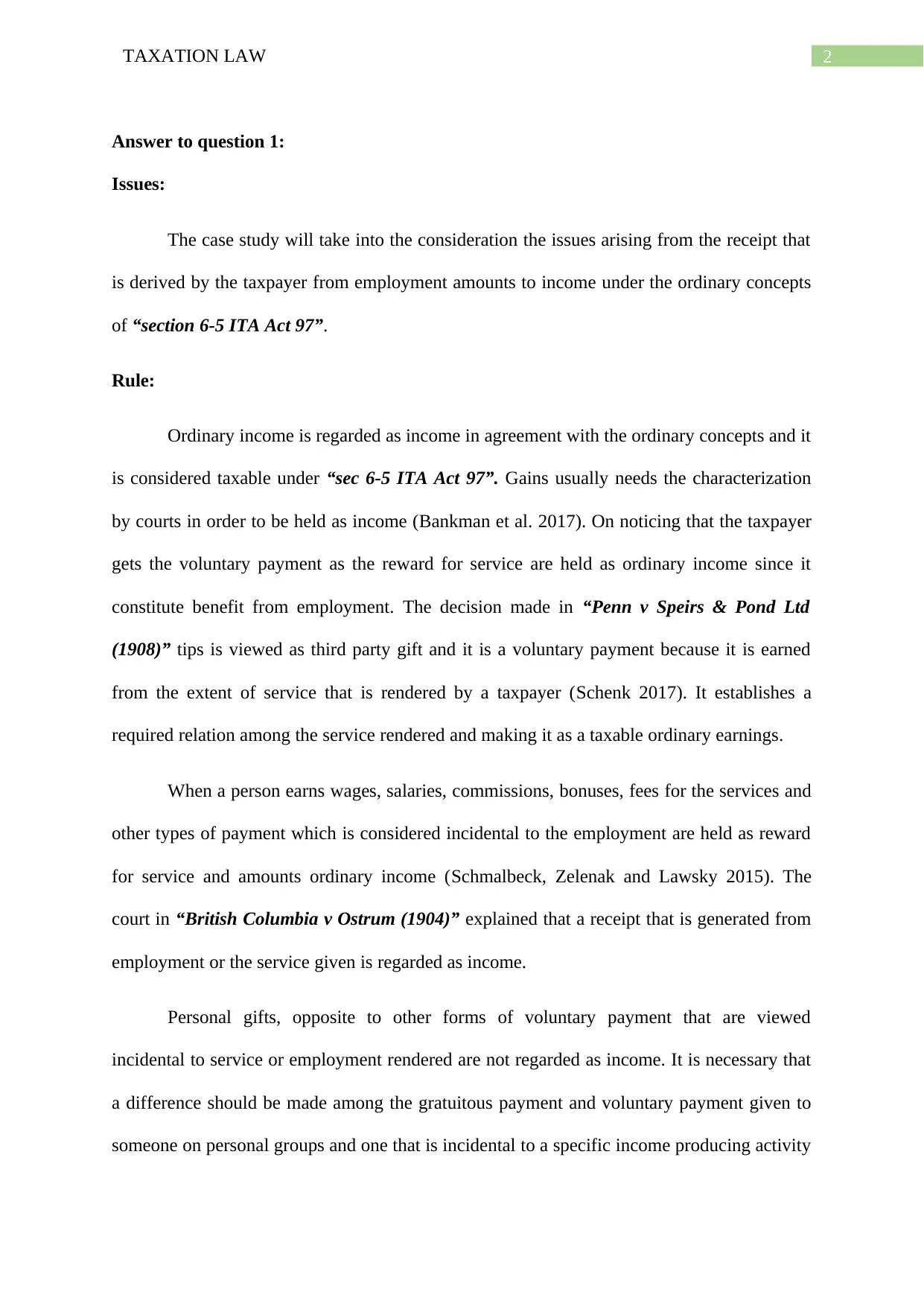
2TAXATION LAW
Answer to question 1:
Issues:
The case study will take into the consideration the issues arising from the receipt that
is derived by the taxpayer from employment amounts to income under the ordinary concepts
of “section 6-5 ITA Act 97”.
Rule:
Ordinary income is regarded as income in agreement with the ordinary concepts and it
is considered taxable under “sec 6-5 ITA Act 97”. Gains usually needs the characterization
by courts in order to be held as income (Bankman et al. 2017). On noticing that the taxpayer
gets the voluntary payment as the reward for service are held as ordinary income since it
constitute benefit from employment. The decision made in “Penn v Speirs & Pond Ltd
(1908)” tips is viewed as third party gift and it is a voluntary payment because it is earned
from the extent of service that is rendered by a taxpayer (Schenk 2017). It establishes a
required relation among the service rendered and making it as a taxable ordinary earnings.
When a person earns wages, salaries, commissions, bonuses, fees for the services and
other types of payment which is considered incidental to the employment are held as reward
for service and amounts ordinary income (Schmalbeck, Zelenak and Lawsky 2015). The
court in “British Columbia v Ostrum (1904)” explained that a receipt that is generated from
employment or the service given is regarded as income.
Personal gifts, opposite to other forms of voluntary payment that are viewed
incidental to service or employment rendered are not regarded as income. It is necessary that
a difference should be made among the gratuitous payment and voluntary payment given to
someone on personal groups and one that is incidental to a specific income producing activity
Answer to question 1:
Issues:
The case study will take into the consideration the issues arising from the receipt that
is derived by the taxpayer from employment amounts to income under the ordinary concepts
of “section 6-5 ITA Act 97”.
Rule:
Ordinary income is regarded as income in agreement with the ordinary concepts and it
is considered taxable under “sec 6-5 ITA Act 97”. Gains usually needs the characterization
by courts in order to be held as income (Bankman et al. 2017). On noticing that the taxpayer
gets the voluntary payment as the reward for service are held as ordinary income since it
constitute benefit from employment. The decision made in “Penn v Speirs & Pond Ltd
(1908)” tips is viewed as third party gift and it is a voluntary payment because it is earned
from the extent of service that is rendered by a taxpayer (Schenk 2017). It establishes a
required relation among the service rendered and making it as a taxable ordinary earnings.
When a person earns wages, salaries, commissions, bonuses, fees for the services and
other types of payment which is considered incidental to the employment are held as reward
for service and amounts ordinary income (Schmalbeck, Zelenak and Lawsky 2015). The
court in “British Columbia v Ostrum (1904)” explained that a receipt that is generated from
employment or the service given is regarded as income.
Personal gifts, opposite to other forms of voluntary payment that are viewed
incidental to service or employment rendered are not regarded as income. It is necessary that
a difference should be made among the gratuitous payment and voluntary payment given to
someone on personal groups and one that is incidental to a specific income producing activity
⊘ This is a preview!⊘
Do you want full access?
Subscribe today to unlock all pages.

Trusted by 1+ million students worldwide
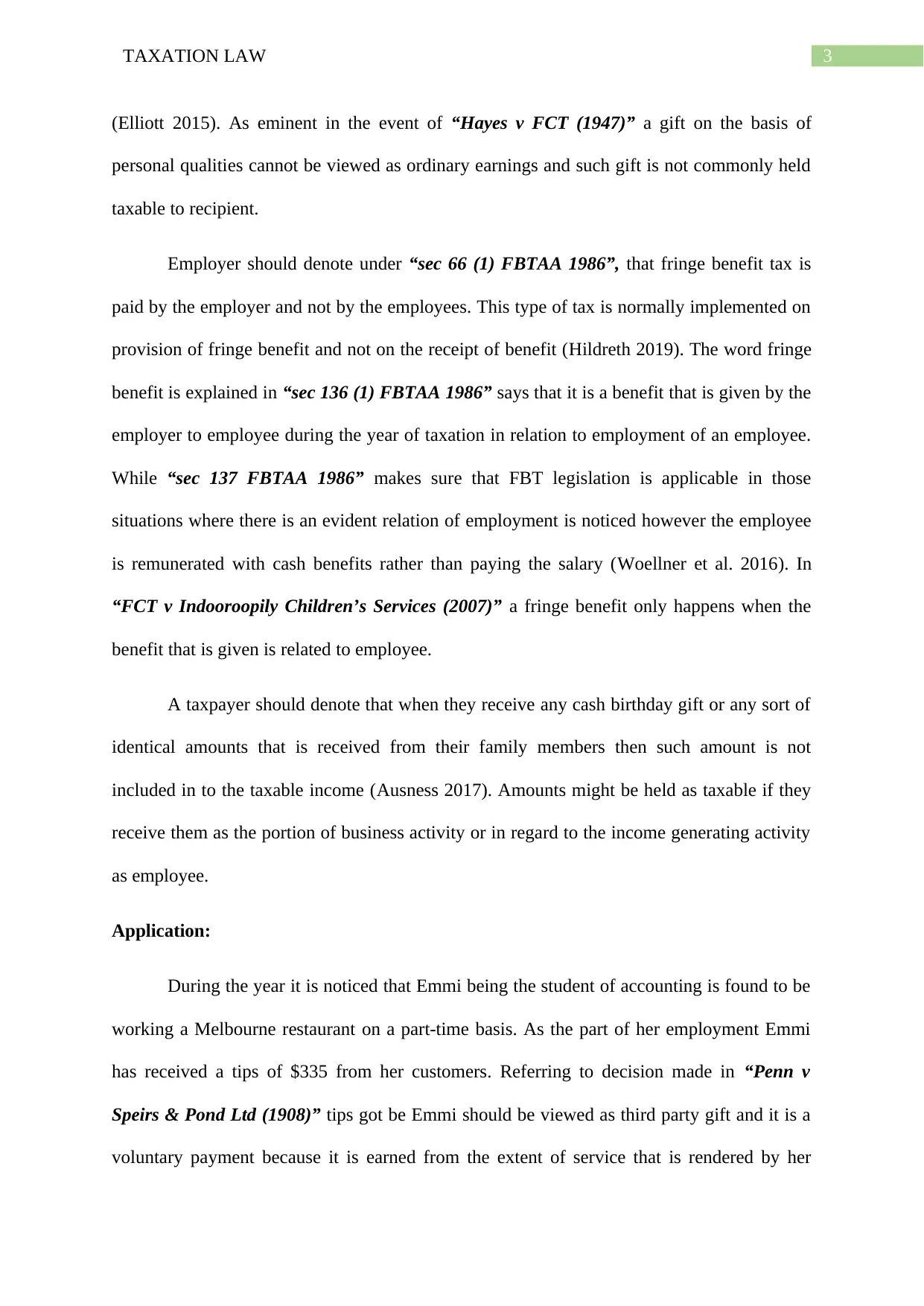
3TAXATION LAW
(Elliott 2015). As eminent in the event of “Hayes v FCT (1947)” a gift on the basis of
personal qualities cannot be viewed as ordinary earnings and such gift is not commonly held
taxable to recipient.
Employer should denote under “sec 66 (1) FBTAA 1986”, that fringe benefit tax is
paid by the employer and not by the employees. This type of tax is normally implemented on
provision of fringe benefit and not on the receipt of benefit (Hildreth 2019). The word fringe
benefit is explained in “sec 136 (1) FBTAA 1986” says that it is a benefit that is given by the
employer to employee during the year of taxation in relation to employment of an employee.
While “sec 137 FBTAA 1986” makes sure that FBT legislation is applicable in those
situations where there is an evident relation of employment is noticed however the employee
is remunerated with cash benefits rather than paying the salary (Woellner et al. 2016). In
“FCT v Indooroopily Children’s Services (2007)” a fringe benefit only happens when the
benefit that is given is related to employee.
A taxpayer should denote that when they receive any cash birthday gift or any sort of
identical amounts that is received from their family members then such amount is not
included in to the taxable income (Ausness 2017). Amounts might be held as taxable if they
receive them as the portion of business activity or in regard to the income generating activity
as employee.
Application:
During the year it is noticed that Emmi being the student of accounting is found to be
working a Melbourne restaurant on a part-time basis. As the part of her employment Emmi
has received a tips of $335 from her customers. Referring to decision made in “Penn v
Speirs & Pond Ltd (1908)” tips got be Emmi should be viewed as third party gift and it is a
voluntary payment because it is earned from the extent of service that is rendered by her
(Elliott 2015). As eminent in the event of “Hayes v FCT (1947)” a gift on the basis of
personal qualities cannot be viewed as ordinary earnings and such gift is not commonly held
taxable to recipient.
Employer should denote under “sec 66 (1) FBTAA 1986”, that fringe benefit tax is
paid by the employer and not by the employees. This type of tax is normally implemented on
provision of fringe benefit and not on the receipt of benefit (Hildreth 2019). The word fringe
benefit is explained in “sec 136 (1) FBTAA 1986” says that it is a benefit that is given by the
employer to employee during the year of taxation in relation to employment of an employee.
While “sec 137 FBTAA 1986” makes sure that FBT legislation is applicable in those
situations where there is an evident relation of employment is noticed however the employee
is remunerated with cash benefits rather than paying the salary (Woellner et al. 2016). In
“FCT v Indooroopily Children’s Services (2007)” a fringe benefit only happens when the
benefit that is given is related to employee.
A taxpayer should denote that when they receive any cash birthday gift or any sort of
identical amounts that is received from their family members then such amount is not
included in to the taxable income (Ausness 2017). Amounts might be held as taxable if they
receive them as the portion of business activity or in regard to the income generating activity
as employee.
Application:
During the year it is noticed that Emmi being the student of accounting is found to be
working a Melbourne restaurant on a part-time basis. As the part of her employment Emmi
has received a tips of $335 from her customers. Referring to decision made in “Penn v
Speirs & Pond Ltd (1908)” tips got be Emmi should be viewed as third party gift and it is a
voluntary payment because it is earned from the extent of service that is rendered by her
Paraphrase This Document
Need a fresh take? Get an instant paraphrase of this document with our AI Paraphraser
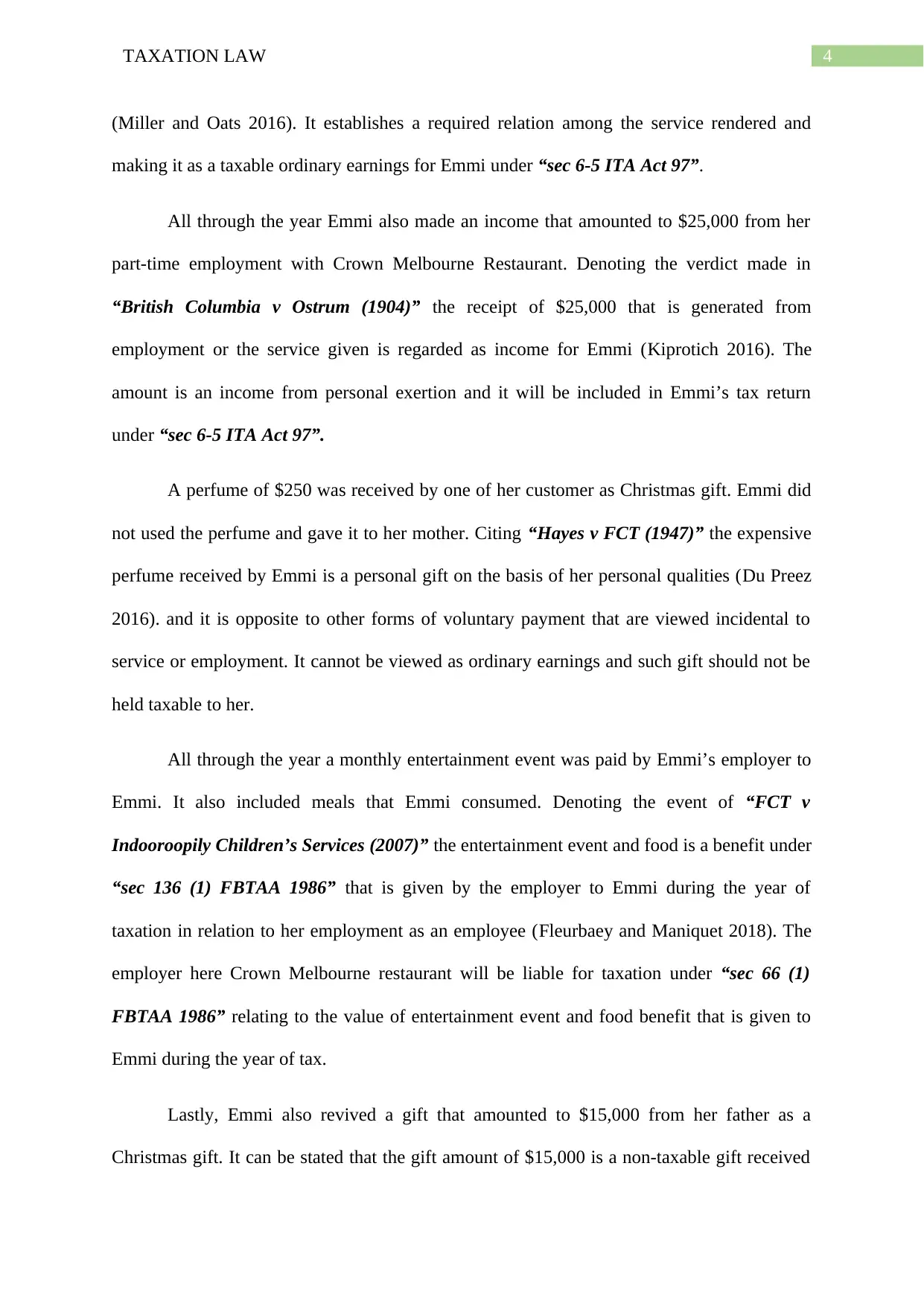
4TAXATION LAW
(Miller and Oats 2016). It establishes a required relation among the service rendered and
making it as a taxable ordinary earnings for Emmi under “sec 6-5 ITA Act 97”.
All through the year Emmi also made an income that amounted to $25,000 from her
part-time employment with Crown Melbourne Restaurant. Denoting the verdict made in
“British Columbia v Ostrum (1904)” the receipt of $25,000 that is generated from
employment or the service given is regarded as income for Emmi (Kiprotich 2016). The
amount is an income from personal exertion and it will be included in Emmi’s tax return
under “sec 6-5 ITA Act 97”.
A perfume of $250 was received by one of her customer as Christmas gift. Emmi did
not used the perfume and gave it to her mother. Citing “Hayes v FCT (1947)” the expensive
perfume received by Emmi is a personal gift on the basis of her personal qualities (Du Preez
2016). and it is opposite to other forms of voluntary payment that are viewed incidental to
service or employment. It cannot be viewed as ordinary earnings and such gift should not be
held taxable to her.
All through the year a monthly entertainment event was paid by Emmi’s employer to
Emmi. It also included meals that Emmi consumed. Denoting the event of “FCT v
Indooroopily Children’s Services (2007)” the entertainment event and food is a benefit under
“sec 136 (1) FBTAA 1986” that is given by the employer to Emmi during the year of
taxation in relation to her employment as an employee (Fleurbaey and Maniquet 2018). The
employer here Crown Melbourne restaurant will be liable for taxation under “sec 66 (1)
FBTAA 1986” relating to the value of entertainment event and food benefit that is given to
Emmi during the year of tax.
Lastly, Emmi also revived a gift that amounted to $15,000 from her father as a
Christmas gift. It can be stated that the gift amount of $15,000 is a non-taxable gift received
(Miller and Oats 2016). It establishes a required relation among the service rendered and
making it as a taxable ordinary earnings for Emmi under “sec 6-5 ITA Act 97”.
All through the year Emmi also made an income that amounted to $25,000 from her
part-time employment with Crown Melbourne Restaurant. Denoting the verdict made in
“British Columbia v Ostrum (1904)” the receipt of $25,000 that is generated from
employment or the service given is regarded as income for Emmi (Kiprotich 2016). The
amount is an income from personal exertion and it will be included in Emmi’s tax return
under “sec 6-5 ITA Act 97”.
A perfume of $250 was received by one of her customer as Christmas gift. Emmi did
not used the perfume and gave it to her mother. Citing “Hayes v FCT (1947)” the expensive
perfume received by Emmi is a personal gift on the basis of her personal qualities (Du Preez
2016). and it is opposite to other forms of voluntary payment that are viewed incidental to
service or employment. It cannot be viewed as ordinary earnings and such gift should not be
held taxable to her.
All through the year a monthly entertainment event was paid by Emmi’s employer to
Emmi. It also included meals that Emmi consumed. Denoting the event of “FCT v
Indooroopily Children’s Services (2007)” the entertainment event and food is a benefit under
“sec 136 (1) FBTAA 1986” that is given by the employer to Emmi during the year of
taxation in relation to her employment as an employee (Fleurbaey and Maniquet 2018). The
employer here Crown Melbourne restaurant will be liable for taxation under “sec 66 (1)
FBTAA 1986” relating to the value of entertainment event and food benefit that is given to
Emmi during the year of tax.
Lastly, Emmi also revived a gift that amounted to $15,000 from her father as a
Christmas gift. It can be stated that the gift amount of $15,000 is a non-taxable gift received
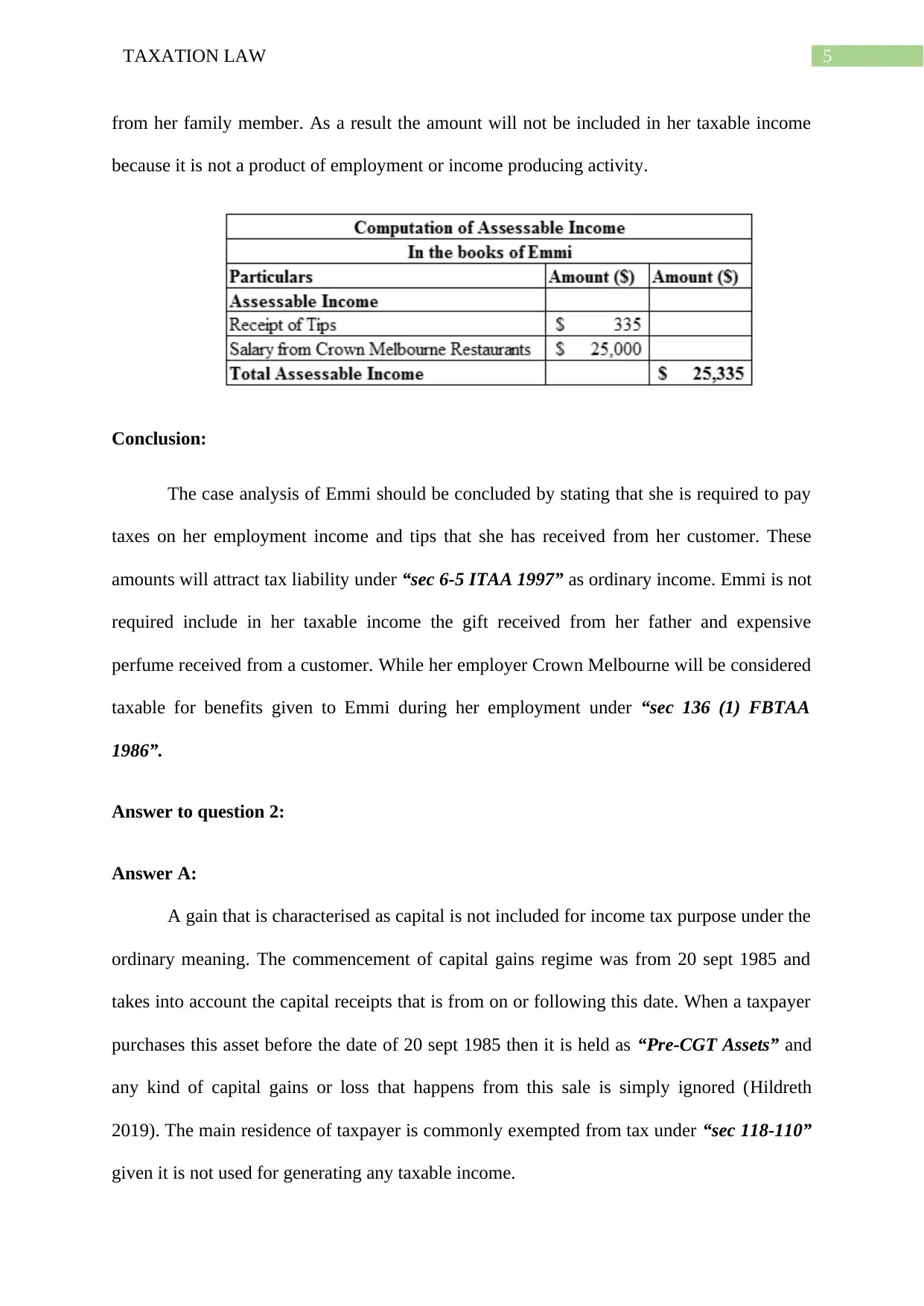
5TAXATION LAW
from her family member. As a result the amount will not be included in her taxable income
because it is not a product of employment or income producing activity.
Conclusion:
The case analysis of Emmi should be concluded by stating that she is required to pay
taxes on her employment income and tips that she has received from her customer. These
amounts will attract tax liability under “sec 6-5 ITAA 1997” as ordinary income. Emmi is not
required include in her taxable income the gift received from her father and expensive
perfume received from a customer. While her employer Crown Melbourne will be considered
taxable for benefits given to Emmi during her employment under “sec 136 (1) FBTAA
1986”.
Answer to question 2:
Answer A:
A gain that is characterised as capital is not included for income tax purpose under the
ordinary meaning. The commencement of capital gains regime was from 20 sept 1985 and
takes into account the capital receipts that is from on or following this date. When a taxpayer
purchases this asset before the date of 20 sept 1985 then it is held as “Pre-CGT Assets” and
any kind of capital gains or loss that happens from this sale is simply ignored (Hildreth
2019). The main residence of taxpayer is commonly exempted from tax under “sec 118-110”
given it is not used for generating any taxable income.
from her family member. As a result the amount will not be included in her taxable income
because it is not a product of employment or income producing activity.
Conclusion:
The case analysis of Emmi should be concluded by stating that she is required to pay
taxes on her employment income and tips that she has received from her customer. These
amounts will attract tax liability under “sec 6-5 ITAA 1997” as ordinary income. Emmi is not
required include in her taxable income the gift received from her father and expensive
perfume received from a customer. While her employer Crown Melbourne will be considered
taxable for benefits given to Emmi during her employment under “sec 136 (1) FBTAA
1986”.
Answer to question 2:
Answer A:
A gain that is characterised as capital is not included for income tax purpose under the
ordinary meaning. The commencement of capital gains regime was from 20 sept 1985 and
takes into account the capital receipts that is from on or following this date. When a taxpayer
purchases this asset before the date of 20 sept 1985 then it is held as “Pre-CGT Assets” and
any kind of capital gains or loss that happens from this sale is simply ignored (Hildreth
2019). The main residence of taxpayer is commonly exempted from tax under “sec 118-110”
given it is not used for generating any taxable income.
⊘ This is a preview!⊘
Do you want full access?
Subscribe today to unlock all pages.

Trusted by 1+ million students worldwide
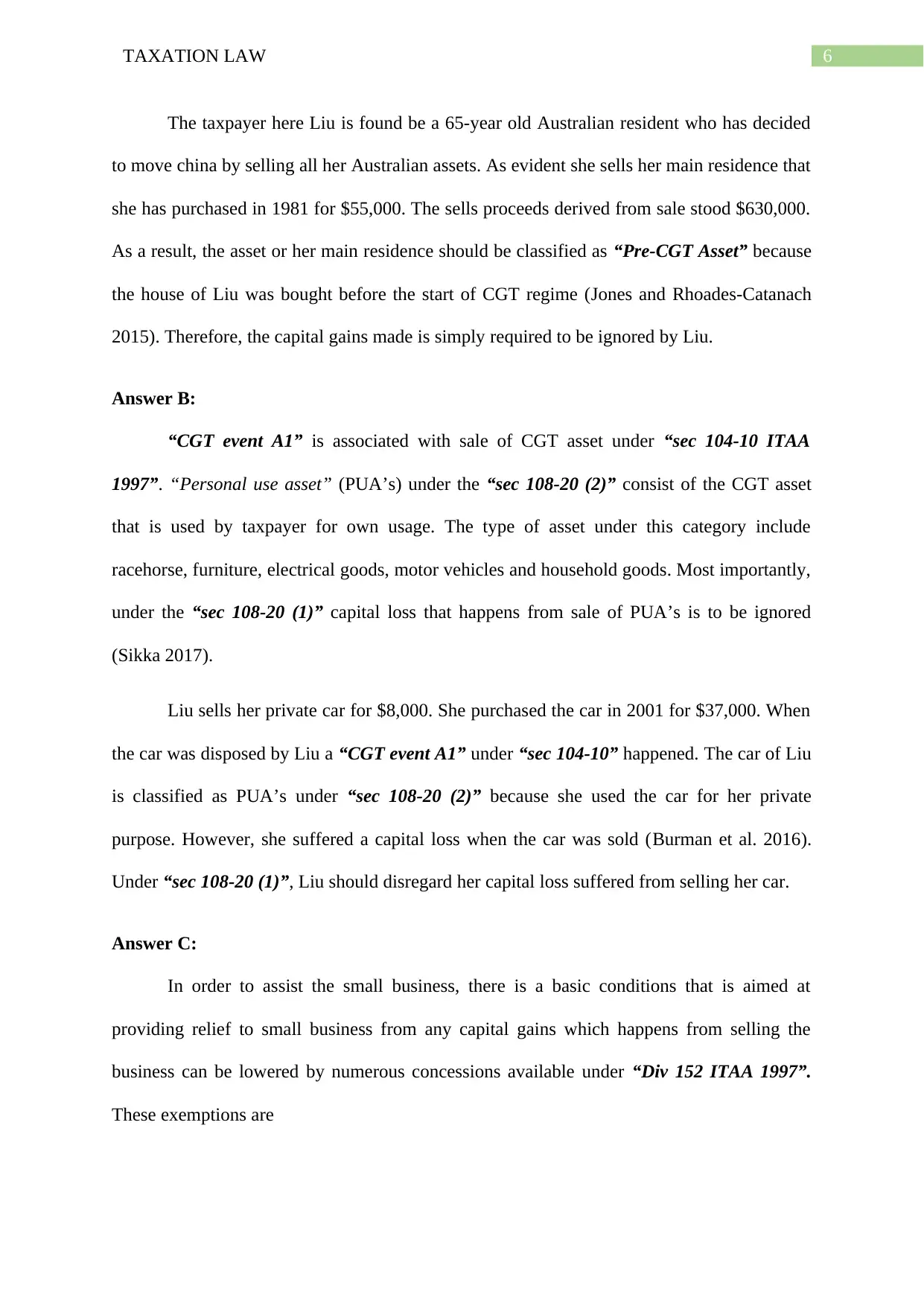
6TAXATION LAW
The taxpayer here Liu is found be a 65-year old Australian resident who has decided
to move china by selling all her Australian assets. As evident she sells her main residence that
she has purchased in 1981 for $55,000. The sells proceeds derived from sale stood $630,000.
As a result, the asset or her main residence should be classified as “Pre-CGT Asset” because
the house of Liu was bought before the start of CGT regime (Jones and Rhoades-Catanach
2015). Therefore, the capital gains made is simply required to be ignored by Liu.
Answer B:
“CGT event A1” is associated with sale of CGT asset under “sec 104-10 ITAA
1997”. “Personal use asset” (PUA’s) under the “sec 108-20 (2)” consist of the CGT asset
that is used by taxpayer for own usage. The type of asset under this category include
racehorse, furniture, electrical goods, motor vehicles and household goods. Most importantly,
under the “sec 108-20 (1)” capital loss that happens from sale of PUA’s is to be ignored
(Sikka 2017).
Liu sells her private car for $8,000. She purchased the car in 2001 for $37,000. When
the car was disposed by Liu a “CGT event A1” under “sec 104-10” happened. The car of Liu
is classified as PUA’s under “sec 108-20 (2)” because she used the car for her private
purpose. However, she suffered a capital loss when the car was sold (Burman et al. 2016).
Under “sec 108-20 (1)”, Liu should disregard her capital loss suffered from selling her car.
Answer C:
In order to assist the small business, there is a basic conditions that is aimed at
providing relief to small business from any capital gains which happens from selling the
business can be lowered by numerous concessions available under “Div 152 ITAA 1997”.
These exemptions are
The taxpayer here Liu is found be a 65-year old Australian resident who has decided
to move china by selling all her Australian assets. As evident she sells her main residence that
she has purchased in 1981 for $55,000. The sells proceeds derived from sale stood $630,000.
As a result, the asset or her main residence should be classified as “Pre-CGT Asset” because
the house of Liu was bought before the start of CGT regime (Jones and Rhoades-Catanach
2015). Therefore, the capital gains made is simply required to be ignored by Liu.
Answer B:
“CGT event A1” is associated with sale of CGT asset under “sec 104-10 ITAA
1997”. “Personal use asset” (PUA’s) under the “sec 108-20 (2)” consist of the CGT asset
that is used by taxpayer for own usage. The type of asset under this category include
racehorse, furniture, electrical goods, motor vehicles and household goods. Most importantly,
under the “sec 108-20 (1)” capital loss that happens from sale of PUA’s is to be ignored
(Sikka 2017).
Liu sells her private car for $8,000. She purchased the car in 2001 for $37,000. When
the car was disposed by Liu a “CGT event A1” under “sec 104-10” happened. The car of Liu
is classified as PUA’s under “sec 108-20 (2)” because she used the car for her private
purpose. However, she suffered a capital loss when the car was sold (Burman et al. 2016).
Under “sec 108-20 (1)”, Liu should disregard her capital loss suffered from selling her car.
Answer C:
In order to assist the small business, there is a basic conditions that is aimed at
providing relief to small business from any capital gains which happens from selling the
business can be lowered by numerous concessions available under “Div 152 ITAA 1997”.
These exemptions are
Paraphrase This Document
Need a fresh take? Get an instant paraphrase of this document with our AI Paraphraser
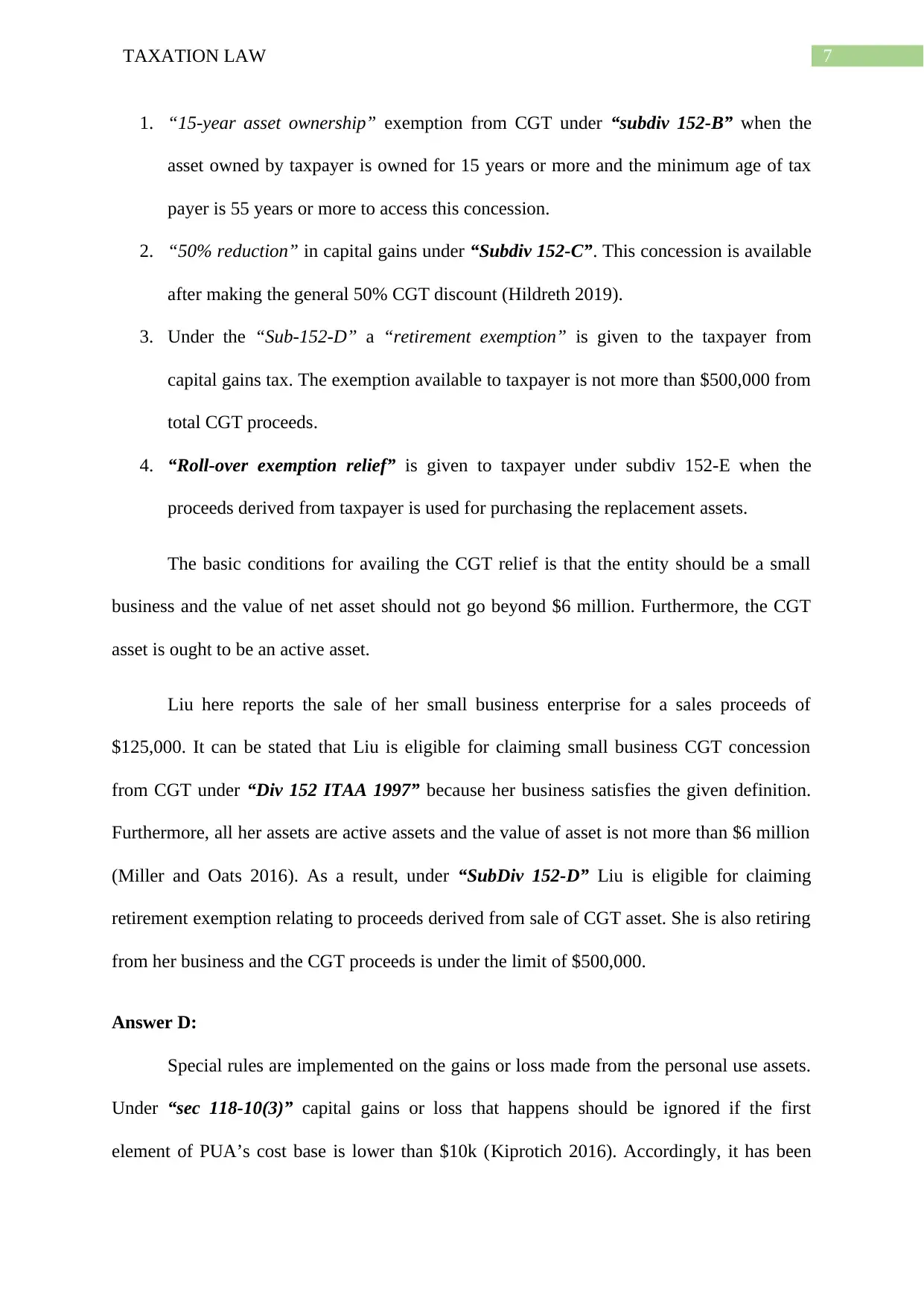
7TAXATION LAW
1. “15-year asset ownership” exemption from CGT under “subdiv 152-B” when the
asset owned by taxpayer is owned for 15 years or more and the minimum age of tax
payer is 55 years or more to access this concession.
2. “50% reduction” in capital gains under “Subdiv 152-C”. This concession is available
after making the general 50% CGT discount (Hildreth 2019).
3. Under the “Sub-152-D” a “retirement exemption” is given to the taxpayer from
capital gains tax. The exemption available to taxpayer is not more than $500,000 from
total CGT proceeds.
4. “Roll-over exemption relief” is given to taxpayer under subdiv 152-E when the
proceeds derived from taxpayer is used for purchasing the replacement assets.
The basic conditions for availing the CGT relief is that the entity should be a small
business and the value of net asset should not go beyond $6 million. Furthermore, the CGT
asset is ought to be an active asset.
Liu here reports the sale of her small business enterprise for a sales proceeds of
$125,000. It can be stated that Liu is eligible for claiming small business CGT concession
from CGT under “Div 152 ITAA 1997” because her business satisfies the given definition.
Furthermore, all her assets are active assets and the value of asset is not more than $6 million
(Miller and Oats 2016). As a result, under “SubDiv 152-D” Liu is eligible for claiming
retirement exemption relating to proceeds derived from sale of CGT asset. She is also retiring
from her business and the CGT proceeds is under the limit of $500,000.
Answer D:
Special rules are implemented on the gains or loss made from the personal use assets.
Under “sec 118-10(3)” capital gains or loss that happens should be ignored if the first
element of PUA’s cost base is lower than $10k (Kiprotich 2016). Accordingly, it has been
1. “15-year asset ownership” exemption from CGT under “subdiv 152-B” when the
asset owned by taxpayer is owned for 15 years or more and the minimum age of tax
payer is 55 years or more to access this concession.
2. “50% reduction” in capital gains under “Subdiv 152-C”. This concession is available
after making the general 50% CGT discount (Hildreth 2019).
3. Under the “Sub-152-D” a “retirement exemption” is given to the taxpayer from
capital gains tax. The exemption available to taxpayer is not more than $500,000 from
total CGT proceeds.
4. “Roll-over exemption relief” is given to taxpayer under subdiv 152-E when the
proceeds derived from taxpayer is used for purchasing the replacement assets.
The basic conditions for availing the CGT relief is that the entity should be a small
business and the value of net asset should not go beyond $6 million. Furthermore, the CGT
asset is ought to be an active asset.
Liu here reports the sale of her small business enterprise for a sales proceeds of
$125,000. It can be stated that Liu is eligible for claiming small business CGT concession
from CGT under “Div 152 ITAA 1997” because her business satisfies the given definition.
Furthermore, all her assets are active assets and the value of asset is not more than $6 million
(Miller and Oats 2016). As a result, under “SubDiv 152-D” Liu is eligible for claiming
retirement exemption relating to proceeds derived from sale of CGT asset. She is also retiring
from her business and the CGT proceeds is under the limit of $500,000.
Answer D:
Special rules are implemented on the gains or loss made from the personal use assets.
Under “sec 118-10(3)” capital gains or loss that happens should be ignored if the first
element of PUA’s cost base is lower than $10k (Kiprotich 2016). Accordingly, it has been
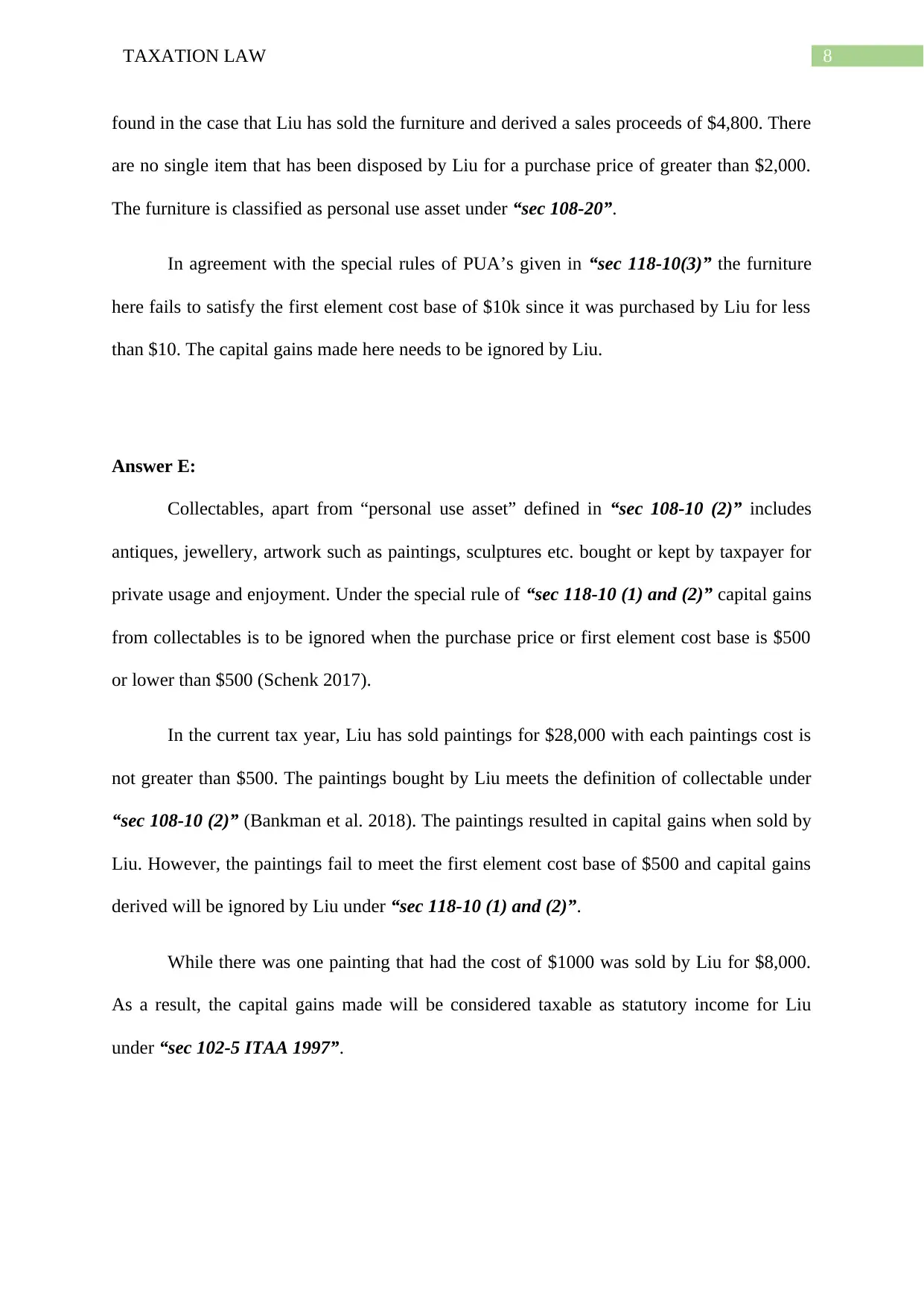
8TAXATION LAW
found in the case that Liu has sold the furniture and derived a sales proceeds of $4,800. There
are no single item that has been disposed by Liu for a purchase price of greater than $2,000.
The furniture is classified as personal use asset under “sec 108-20”.
In agreement with the special rules of PUA’s given in “sec 118-10(3)” the furniture
here fails to satisfy the first element cost base of $10k since it was purchased by Liu for less
than $10. The capital gains made here needs to be ignored by Liu.
Answer E:
Collectables, apart from “personal use asset” defined in “sec 108-10 (2)” includes
antiques, jewellery, artwork such as paintings, sculptures etc. bought or kept by taxpayer for
private usage and enjoyment. Under the special rule of “sec 118-10 (1) and (2)” capital gains
from collectables is to be ignored when the purchase price or first element cost base is $500
or lower than $500 (Schenk 2017).
In the current tax year, Liu has sold paintings for $28,000 with each paintings cost is
not greater than $500. The paintings bought by Liu meets the definition of collectable under
“sec 108-10 (2)” (Bankman et al. 2018). The paintings resulted in capital gains when sold by
Liu. However, the paintings fail to meet the first element cost base of $500 and capital gains
derived will be ignored by Liu under “sec 118-10 (1) and (2)”.
While there was one painting that had the cost of $1000 was sold by Liu for $8,000.
As a result, the capital gains made will be considered taxable as statutory income for Liu
under “sec 102-5 ITAA 1997”.
found in the case that Liu has sold the furniture and derived a sales proceeds of $4,800. There
are no single item that has been disposed by Liu for a purchase price of greater than $2,000.
The furniture is classified as personal use asset under “sec 108-20”.
In agreement with the special rules of PUA’s given in “sec 118-10(3)” the furniture
here fails to satisfy the first element cost base of $10k since it was purchased by Liu for less
than $10. The capital gains made here needs to be ignored by Liu.
Answer E:
Collectables, apart from “personal use asset” defined in “sec 108-10 (2)” includes
antiques, jewellery, artwork such as paintings, sculptures etc. bought or kept by taxpayer for
private usage and enjoyment. Under the special rule of “sec 118-10 (1) and (2)” capital gains
from collectables is to be ignored when the purchase price or first element cost base is $500
or lower than $500 (Schenk 2017).
In the current tax year, Liu has sold paintings for $28,000 with each paintings cost is
not greater than $500. The paintings bought by Liu meets the definition of collectable under
“sec 108-10 (2)” (Bankman et al. 2018). The paintings resulted in capital gains when sold by
Liu. However, the paintings fail to meet the first element cost base of $500 and capital gains
derived will be ignored by Liu under “sec 118-10 (1) and (2)”.
While there was one painting that had the cost of $1000 was sold by Liu for $8,000.
As a result, the capital gains made will be considered taxable as statutory income for Liu
under “sec 102-5 ITAA 1997”.
⊘ This is a preview!⊘
Do you want full access?
Subscribe today to unlock all pages.

Trusted by 1+ million students worldwide
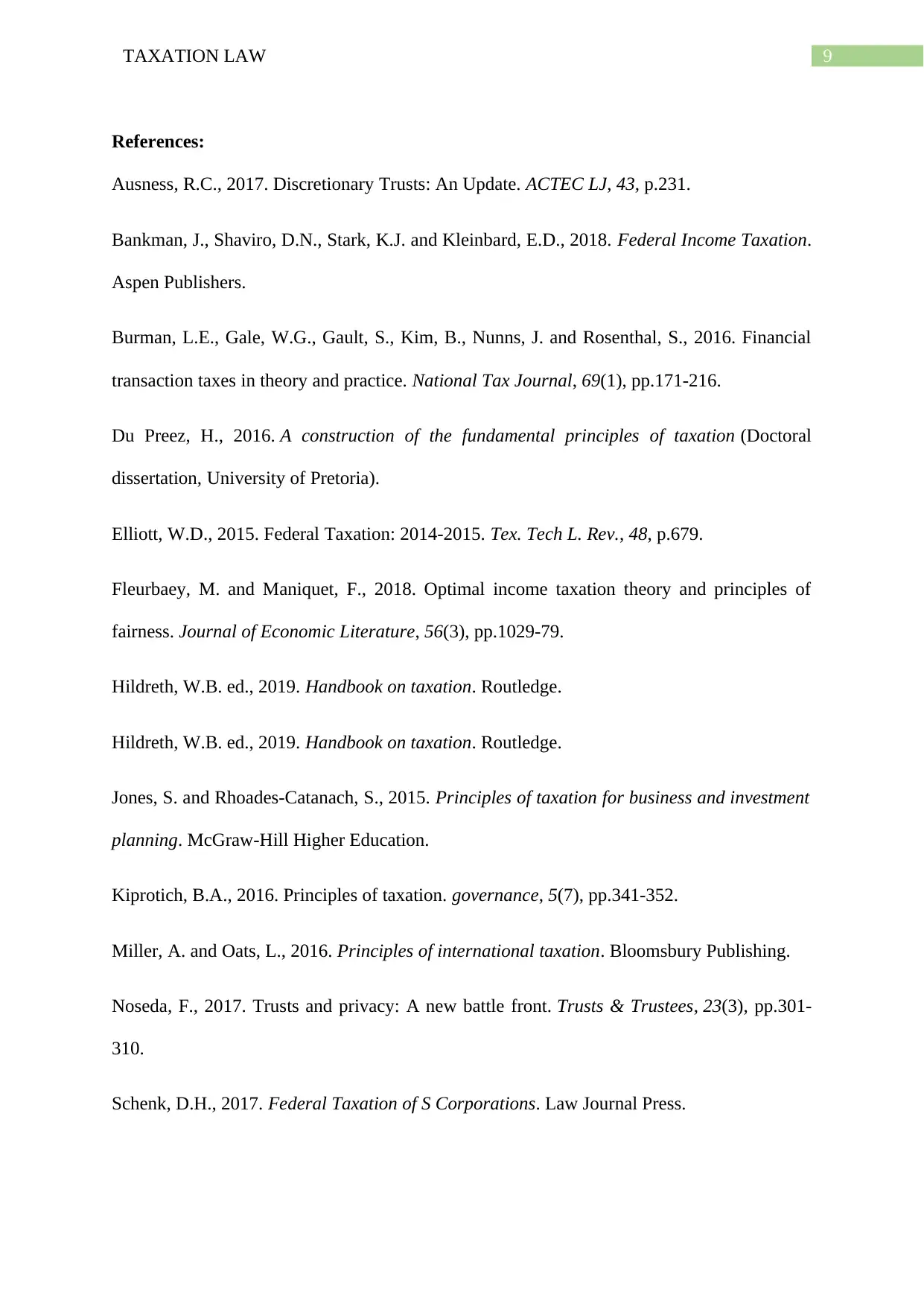
9TAXATION LAW
References:
Ausness, R.C., 2017. Discretionary Trusts: An Update. ACTEC LJ, 43, p.231.
Bankman, J., Shaviro, D.N., Stark, K.J. and Kleinbard, E.D., 2018. Federal Income Taxation.
Aspen Publishers.
Burman, L.E., Gale, W.G., Gault, S., Kim, B., Nunns, J. and Rosenthal, S., 2016. Financial
transaction taxes in theory and practice. National Tax Journal, 69(1), pp.171-216.
Du Preez, H., 2016. A construction of the fundamental principles of taxation (Doctoral
dissertation, University of Pretoria).
Elliott, W.D., 2015. Federal Taxation: 2014-2015. Tex. Tech L. Rev., 48, p.679.
Fleurbaey, M. and Maniquet, F., 2018. Optimal income taxation theory and principles of
fairness. Journal of Economic Literature, 56(3), pp.1029-79.
Hildreth, W.B. ed., 2019. Handbook on taxation. Routledge.
Hildreth, W.B. ed., 2019. Handbook on taxation. Routledge.
Jones, S. and Rhoades-Catanach, S., 2015. Principles of taxation for business and investment
planning. McGraw-Hill Higher Education.
Kiprotich, B.A., 2016. Principles of taxation. governance, 5(7), pp.341-352.
Miller, A. and Oats, L., 2016. Principles of international taxation. Bloomsbury Publishing.
Noseda, F., 2017. Trusts and privacy: A new battle front. Trusts & Trustees, 23(3), pp.301-
310.
Schenk, D.H., 2017. Federal Taxation of S Corporations. Law Journal Press.
References:
Ausness, R.C., 2017. Discretionary Trusts: An Update. ACTEC LJ, 43, p.231.
Bankman, J., Shaviro, D.N., Stark, K.J. and Kleinbard, E.D., 2018. Federal Income Taxation.
Aspen Publishers.
Burman, L.E., Gale, W.G., Gault, S., Kim, B., Nunns, J. and Rosenthal, S., 2016. Financial
transaction taxes in theory and practice. National Tax Journal, 69(1), pp.171-216.
Du Preez, H., 2016. A construction of the fundamental principles of taxation (Doctoral
dissertation, University of Pretoria).
Elliott, W.D., 2015. Federal Taxation: 2014-2015. Tex. Tech L. Rev., 48, p.679.
Fleurbaey, M. and Maniquet, F., 2018. Optimal income taxation theory and principles of
fairness. Journal of Economic Literature, 56(3), pp.1029-79.
Hildreth, W.B. ed., 2019. Handbook on taxation. Routledge.
Hildreth, W.B. ed., 2019. Handbook on taxation. Routledge.
Jones, S. and Rhoades-Catanach, S., 2015. Principles of taxation for business and investment
planning. McGraw-Hill Higher Education.
Kiprotich, B.A., 2016. Principles of taxation. governance, 5(7), pp.341-352.
Miller, A. and Oats, L., 2016. Principles of international taxation. Bloomsbury Publishing.
Noseda, F., 2017. Trusts and privacy: A new battle front. Trusts & Trustees, 23(3), pp.301-
310.
Schenk, D.H., 2017. Federal Taxation of S Corporations. Law Journal Press.
Paraphrase This Document
Need a fresh take? Get an instant paraphrase of this document with our AI Paraphraser
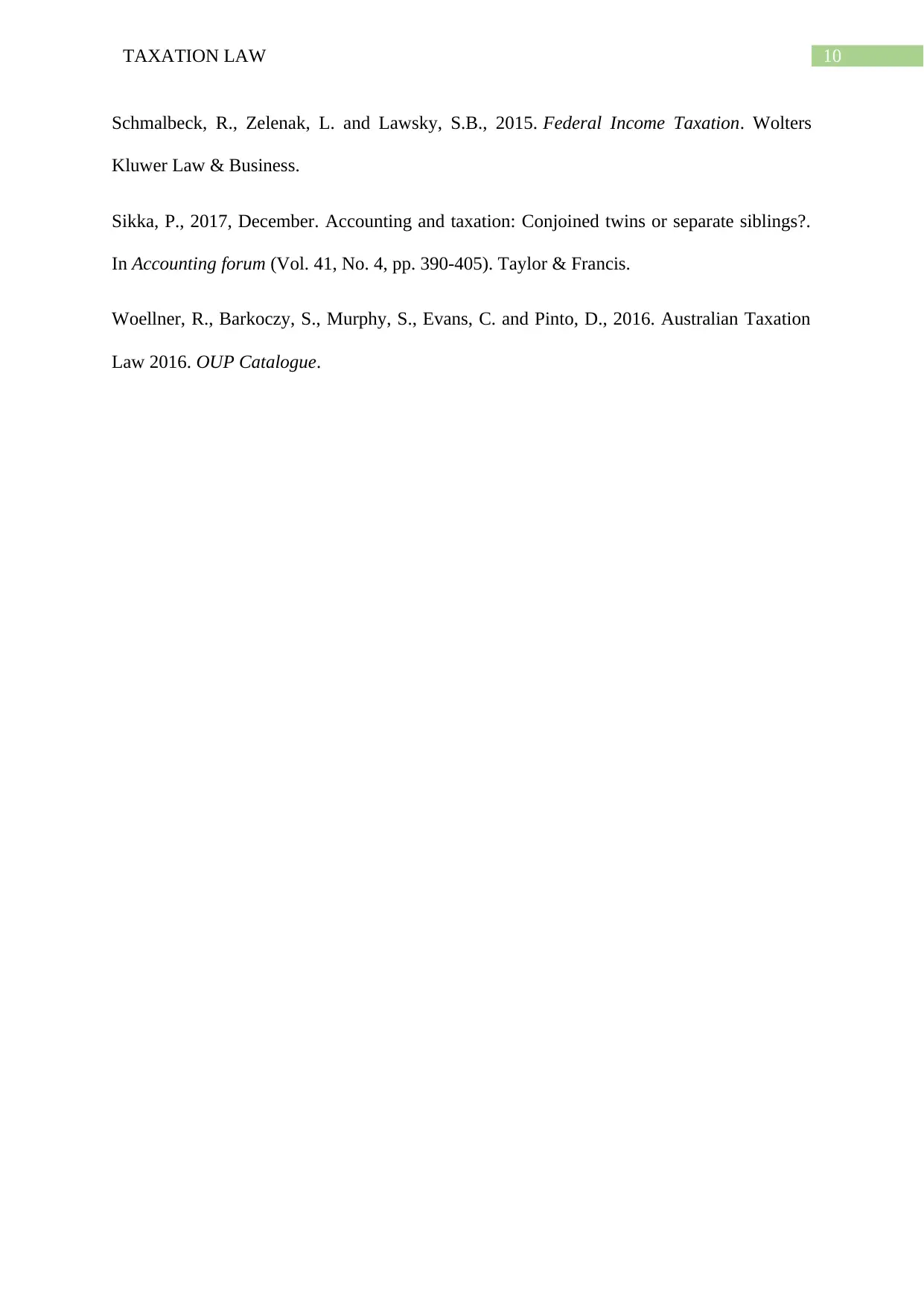
10TAXATION LAW
Schmalbeck, R., Zelenak, L. and Lawsky, S.B., 2015. Federal Income Taxation. Wolters
Kluwer Law & Business.
Sikka, P., 2017, December. Accounting and taxation: Conjoined twins or separate siblings?.
In Accounting forum (Vol. 41, No. 4, pp. 390-405). Taylor & Francis.
Woellner, R., Barkoczy, S., Murphy, S., Evans, C. and Pinto, D., 2016. Australian Taxation
Law 2016. OUP Catalogue.
Schmalbeck, R., Zelenak, L. and Lawsky, S.B., 2015. Federal Income Taxation. Wolters
Kluwer Law & Business.
Sikka, P., 2017, December. Accounting and taxation: Conjoined twins or separate siblings?.
In Accounting forum (Vol. 41, No. 4, pp. 390-405). Taylor & Francis.
Woellner, R., Barkoczy, S., Murphy, S., Evans, C. and Pinto, D., 2016. Australian Taxation
Law 2016. OUP Catalogue.
1 out of 11
Related Documents
Your All-in-One AI-Powered Toolkit for Academic Success.
+13062052269
info@desklib.com
Available 24*7 on WhatsApp / Email
![[object Object]](/_next/static/media/star-bottom.7253800d.svg)
Unlock your academic potential
Copyright © 2020–2026 A2Z Services. All Rights Reserved. Developed and managed by ZUCOL.





